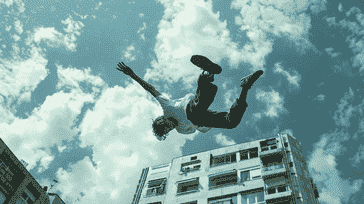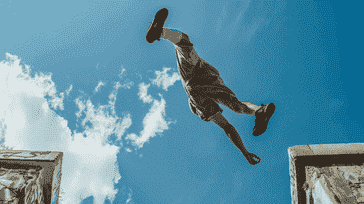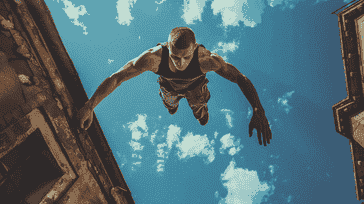Parkour Competitions: Showcasing Skill and Creativity in Action

Introduction to parkour: Definition and history
Parkour, an athletic discipline that combines running, jumping, and climbing, has gained significant popularity in recent years. The word "parkour" originates from the French word "parcours," meaning "course" or "route." It was developed in the late 1980s by David Belle, who drew inspiration from his father and military training. Parkour focuses on efficient, fluid movement through obstacles and urban environments. Its practitioners, known as traceurs, seek to overcome physical and mental barriers, showcasing their skills and creativity.
The rise of parkour as an extreme sport

What began as a method of training for emergency situations has evolved into a thrilling extreme sport. Parkours rise in popularity can be attributed to its inclusion in movies, such as "District B13" and the "James Bond" series. These films brought parkour into the mainstream, captivating audiences with the mesmerizing movements and daring stunts of the traceurs. The adrenaline rush and the awe-inspiring nature of parkour have attracted a growing community of practitioners worldwide.
Parkour vs. freerunning: Whats the difference?
While parkour and freerunning are often used interchangeably, they have distinct differences. Parkour emphasizes efficiency and practicality, focusing on reaching the destination using the most direct and efficient path. Freerunning, on the other hand, incorporates elements of artistic expression and acrobatics. It allows traceurs to add flips, spins, and other creative movements to their repertoire, expanding the boundaries of parkour. Both disciplines share the same core principles of overcoming obstacles but offer different avenues for self-expression.
The philosophy behind parkour: Expressing creativity through movement

Parkour is not just about physical prowess; it also embodies a unique philosophy. At its core, parkour encourages practitioners to think creatively and find innovative ways to navigate their surroundings. It promotes self-improvement, mental resilience, and problem-solving skills. Parkour challenges individuals to see the world as a playground and to find beauty in the everyday environment. It fosters a mindset of adaptability and resilience, allowing traceurs to overcome both physical and mental obstacles.
The physical and mental benefits of practicing parkour
Engaging in parkour offers numerous physical and mental benefits. Physically, parkour is a full-body workout that improves strength, agility, balance, and coordination. The explosive movements and constant challenges also enhance cardiovascular fitness. Mentally, parkour cultivates focus, determination, and self-confidence. It pushes practitioners to step out of their comfort zones, develop problem-solving skills, and embrace calculated risks. Parkour provides a holistic approach to fitness, offering a unique blend of physical and mental challenges.
Parkour competitions: A platform to showcase skill and creativity

Parkour competitions provide a stage for traceurs to demonstrate their skills and creativity. These events bring together athletes from around the world, showcasing their abilities in a competitive setting. Competitions often feature various challenges, such as timed courses, freestyle routines, and specific obstacle courses. Judges evaluate each competitors technique, style, and overall performance. Parkour competitions not only celebrate the athleticism of the participants but also inspire others to explore the possibilities of movement in urban environments.
The most famous parkour competitions around the world
Several renowned parkour competitions have gained international recognition. The Red Bull Art of Motion is one such event, attracting top traceurs from across the globe. This competition showcases the artistic side of parkour, with athletes performing breathtaking freestyle routines in awe-inspiring locations. Another notable event is the NAPC (North American Parkour Championships), which features a combination of speed, style, and technical challenges. These competitions provide a platform for traceurs to connect, learn from each other, and push the boundaries of their abilities.
How to prepare for a parkour competition: Training and conditioning tips
To excel in a parkour competition, rigorous training and conditioning are essential. Regular practice of parkour techniques, such as precision jumps, vaults, and wall runs, is crucial. Strengthening the core, upper body, and lower body muscles through targeted exercises will enhance performance. Endurance training, such as running and circuit workouts, will improve overall stamina. Mental preparation is equally important, as competitors need to develop focus, concentration, and the ability to adapt quickly to unpredictable obstacles. Visualizing the course and practicing under pressure will help build confidence and mental resilience.
Parkour equipment and gear: What you need to compete
Parkour competitions require minimal equipment and gear. The most essential item is a good pair of parkour shoes, providing grip, flexibility, and protection. Lightweight and breathable clothing that allows freedom of movement is also necessary. Optional gear includes wristbands for added support, gloves for grip, and knee pads for protection. However, it is important to strike a balance between safety and unrestricted movement. Competitors should choose equipment and gear that enhance performance without hindering their ability to execute parkour techniques effectively.
Parkour safety: Minimizing risks and preventing injuries
Parkour, like any extreme sport, carries inherent risks. Safety should always be a top priority for practitioners, especially during competitions. Proper warm-up exercises, stretching, and mobility drills are vital to prevent injuries. Learning and mastering techniques progressively under the guidance of experienced instructors is crucial. Competitors should always assess their surroundings, identify potential hazards, and make informed decisions. Building a strong foundation of physical fitness and technique is key to minimizing risks and ensuring a safe practice of parkour.
Parkour as urban exploration: Discovering new environments through movement
One unique aspect of parkour is its ability to transform urban environments into playgrounds for exploration. Practitioners see the world through a different lens, constantly searching for new challenges and obstacles. Parkour allows individuals to interact with their surroundings in unconventional ways, discovering hidden paths, and unlocking new possibilities. It encourages a sense of curiosity, adventure, and appreciation for the urban landscape. Parkour provides an avenue for individuals to break free from the constraints of traditional movement and engage with their environment in a dynamic and liberating manner.
Parkour communities and organizations: Connecting with fellow practitioners
Parkour has fostered the growth of vibrant communities and organizations worldwide. These communities provide a supportive and collaborative environment for traceurs to connect, share knowledge, and inspire one another. Parkour gatherings, workshops, and training sessions allow practitioners to exchange ideas, learn new techniques, and build lasting friendships. Organizations such as the World Freerunning Parkour Federation (WFPF) and International Parkour Federation (IPF) actively promote the discipline, organize events, and provide resources for traceurs to develop their skills and connect with the global parkour community.
Parkour as a high adrenaline activity: The thrill of overcoming obstacles
One of the main draws of parkour is the adrenaline rush it provides. The exhilaration of overcoming physical and mental obstacles, pushing personal limits, and executing precise movements creates an unparalleled sense of accomplishment. The thrill of parkour lies in the freedom and creativity it offers, allowing individuals to express themselves through movement. Whether its jumping from rooftop to rooftop or navigating complex environments with speed and agility, the adrenaline-fueled nature of parkour captivates both participants and spectators alike.
Conclusion: Embracing the art and athleticism of parkour
Parkour is more than just a sport; it is an art form that combines athleticism, creativity, and a unique philosophy. It challenges individuals to embrace their surroundings, overcome obstacles, and express themselves through movement. Parkour competitions provide a platform for traceurs to showcase their skills and inspire others to explore their own potential. With its physical and mental benefits, urban exploration aspect, and strong sense of community, parkour continues to attract individuals seeking a dynamic, thrilling, and expressive way to engage with the world. Embrace the art and athleticism of parkour and discover the boundless possibilities within yourself.
CTA: If youre intrigued by the world of parkour, take the leap and join a local parkour community or organization near you. Explore the artistry and athleticism of parkour, challenge yourself, and unlock your true potential.


